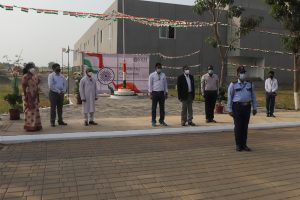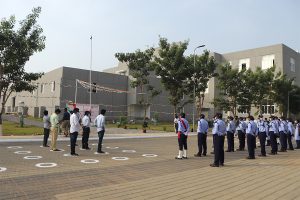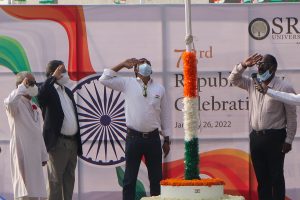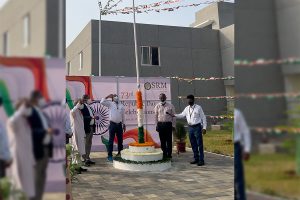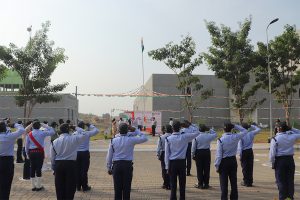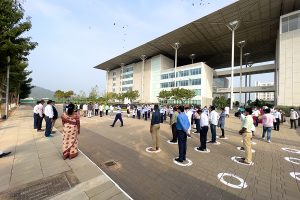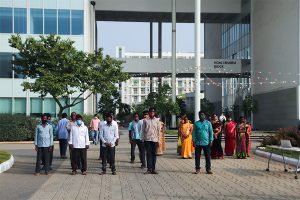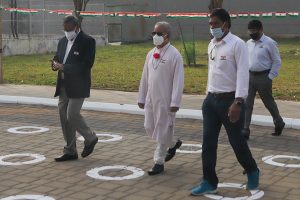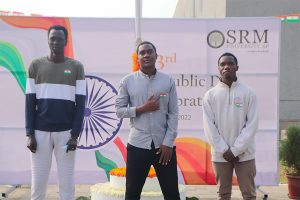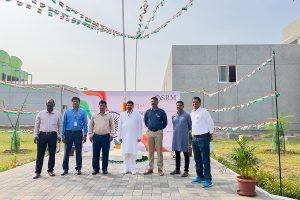SRM-AP All News
ALL News
- Dr Aqsa Agha receives the South Asia Public Health Fellowship February 5, 2022
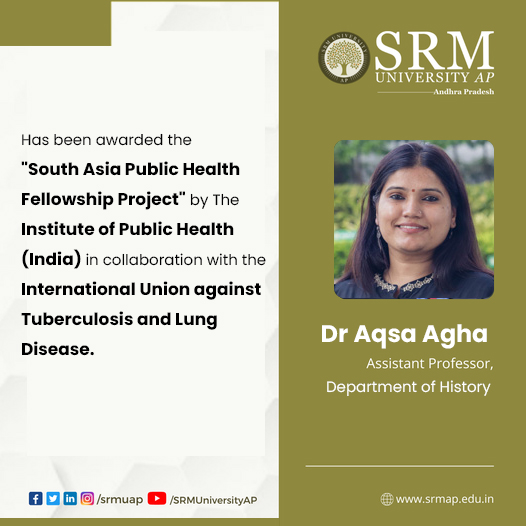 Dr Aqsa Agha, Assistant Professor, the Department of History, has been awarded the South Asia Public Health Fellowship Project by The Institute of Public Health (India) in collaboration with the International Union against Tuberculosis and Lung Disease. As the South Asia Public Health Fellow-India, Dr Agha is expected to conduct research on the ethics of the tobacco industry and submit the report over a period of 8 months, i.e. from December 01, 2021, to July 31, 2022. She has been granted an amount of USD 6660 to carry out the project.
Dr Aqsa Agha, Assistant Professor, the Department of History, has been awarded the South Asia Public Health Fellowship Project by The Institute of Public Health (India) in collaboration with the International Union against Tuberculosis and Lung Disease. As the South Asia Public Health Fellow-India, Dr Agha is expected to conduct research on the ethics of the tobacco industry and submit the report over a period of 8 months, i.e. from December 01, 2021, to July 31, 2022. She has been granted an amount of USD 6660 to carry out the project.Along with producing a quality case study on India focusing on industry interferences promoting the tobacco epidemic and undermining public policies related to tobacco control, the project entails drafting the regional report on South Asia. It will bring together country-level case studies and implications between December-May, 2022, engaging in the dissemination of the country-level case studies with relevant stakeholders in June-July 2022.
Article 5.3 of the World Health Organization Framework Convention on Tobacco Control (WHO FCTC) acts as a treaty for ratified countries to protect their citizens against the commercial and vested interests of the tobacco industry as per guidelines laid down in the said article. Countries of South Asia, including India, have signed and fully ratified this treaty in the early 2000s. However, the lack of robust national policies and continued influence of the tobacco industry perpetuates the tobacco epidemic, as established in the available literature. Given each country’s mandate to protect the health of its citizens, there is a growing need to understand issues of tobacco industry interferences that undermine public policies meant to protect its population. The South Asian Public Health Fellowship is an initiative to generate knowledge regarding issues of tobacco industry interference not only in India but in other countries of South Asia (i.e., Nepal, Sri Lanka and Bangladesh) to better understand such issues from a regional perspective.
Dr Aqsa Agha holds a PhD in History from the Centre for Historical Studies, JNU. She is also the Project Head of Unnat Bharat Abhiyan at SRM University-AP. Before joining SRM University-AP, Dr Agha was a Consultant with Partners in Change, New Delhi and prepared a report titled “Status of Corporate Responsibility in India, 2020”, focusing on corporate responsibility and ethical business practices. Prior to that, she worked as a Research Officer for National Research Study on Human Trafficking in India at TISS, Mumbai. Before TISS, she worked with the Human Rights Defenders’ Alert- India on human rights violations on the India-Bangladesh border in West Bengal. Along with teaching, she has consulted with organisations, including the Centre for Equity Studies, New Delhi, where she conducted sessions with grassroots activists to effectively observe, analyse and document reality through participatory research. Her broader research interest lies in historical processes and their impact on the social locations of class, caste and gender.
Continue reading → - Advanced research on secure transmission of medical images February 5, 2022
 SRM University-AP promotes translational research that can add value to society making lives better. Following the tradition, Dr Priyanka Singh, Assistant Professor and her PhD student Ms Jyothsna Devi from the Department of Computer Science and Engineering have published their recent research work “Region-based Hybrid Medical Image Watermarking Scheme for Robust and Secured Transmission in IoMT” in ‘IEEE Access journal’ (Impact Factor of 3.36).
SRM University-AP promotes translational research that can add value to society making lives better. Following the tradition, Dr Priyanka Singh, Assistant Professor and her PhD student Ms Jyothsna Devi from the Department of Computer Science and Engineering have published their recent research work “Region-based Hybrid Medical Image Watermarking Scheme for Robust and Secured Transmission in IoMT” in ‘IEEE Access journal’ (Impact Factor of 3.36).Dr Priyanka’s research focuses on the healthcare industry that is rapidly transforming medical images into ones that operate in real-time environments (IoMT, IoT, Cloud and so on). The research is proposed to address security and integrity issues in medical image transmission on IoT and edge healthcare applications with a lossless reversible region-based MIW scheme.
In this era of technological advancement, medical images and patient information are widely transmitted through a public transmission channel on the Internet of Medical Things (IoMT) applications. While sharing medical images or electronic patient records (EPR) through a public network, they can get tampered with or manipulated, leading to the wrong diagnosis by the medical consultants. Confidentiality of the patient record is also a major concern. Thus, it is very important to ensure the authenticity, authorisation, integrity, and confidentiality of the information during transmission.
ABSTRACT:
With the growth in Internet and digital technology, the Internet of Medical Things (IoMT) and Telemedicine have become buzzwords in healthcare. A large number of medical images and information are shared through a public network in these applications. This paper proposes a region-based hybrid Medical Image Watermarking (MIW) scheme to ensure the authenticity, authorisation, integrity, and confidentiality of the medical images transmitted through a public network in IoMT. In the proposed scheme, the medical image is segmented into Region of Interest (RoI) and Region of Non-Interest (RoNI).
RoI tamper detection and recovery bits are embedded in RoI to ensure the integrity of the medical image. RoI is watermarked using adaptive Least Significant Bit (LSB) substitution with respect to the hiding capacity map for higher RoI imperceptibility and accuracy in tamper detection and recovery. Electronic Patient Record (EPR) is compressed using Huffman coding and encrypted using a pseudo-random key (secret key) to provide higher confidentiality and payload. Encrypted EPR, QR code of hospital logo and RoI recovery bits are embedded in RoNI using Discrete Wavelet Transform-Singular Value Decomposition (DWT-SVD) hybrid transforms to achieve a robust watermark.
The proposed scheme is tested under various geometric and non-geometric attacks such as filtering, compression, rotation, salt and pepper noise and shearing. The evaluation results demonstrate that the proposed scheme has high imperceptibility, robustness, security, payload, tamper detection, and recovery accuracy under image processing attacks. Therefore, the proposed scheme can be used in the transmission of medical images and EPR in IoMT. The relevance of the proposed scheme is established by its superior performance in comparison to some of the popular existing schemes.
Continue reading → - Startup incubated by BBA student crosses ₹1 crore turnover February 2, 2022
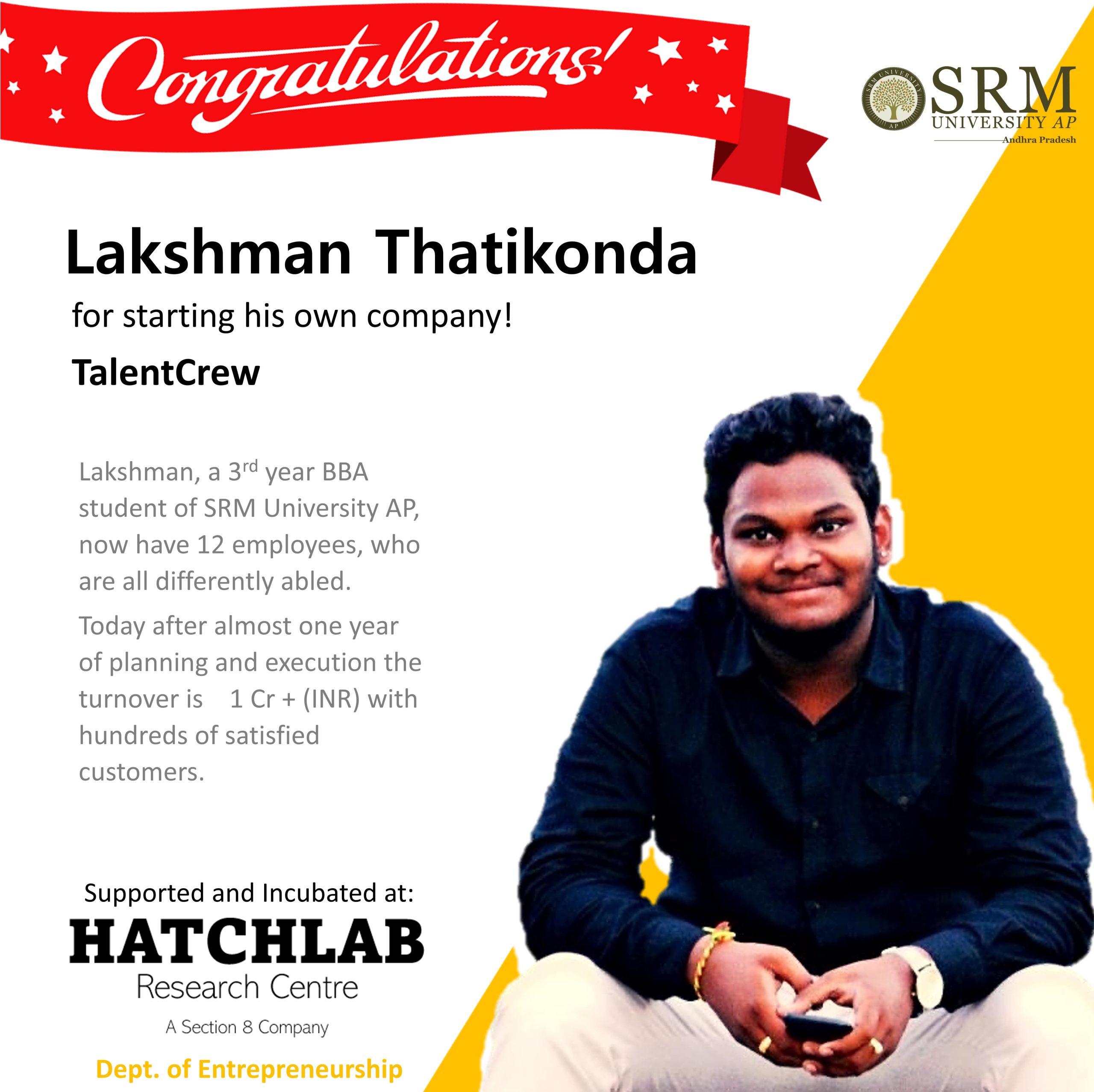 Mr Lakshman Thatikonda, a 3rd year BBA student of SRM University-AP, has started his own business venture (TalentCrew), incubated at the Hatchlab Research Centre– The technology and livelihood business incubator of SRM University-AP.
Mr Lakshman Thatikonda, a 3rd year BBA student of SRM University-AP, has started his own business venture (TalentCrew), incubated at the Hatchlab Research Centre– The technology and livelihood business incubator of SRM University-AP.The talent crew is a skill-based startup. They are one of India’s largest multi-category customised gifting companies, providing one of the best-curated collections of festival merchandise, gifts, handicrafts, wedding cards, carvings & personalised products for all occasions & festivals. TalentCrew has a global footprint with customers spanning 20 plus countries and the capability to deliver gifts to over 50 countries and 300 plus cities in India. Mr Lakshman started this organisation on the principles of creativity, agility, and social responsibility.
Over the next few years, TalentCrew envisions exploring and developing new products and services that will actively expand business while touching social responsibility.
Experience at Hatchlab Research Centre
The Hatchlab research centre aims to support SRM E-Cell’s mission of developing entrepreneurial talent and fostering the commercialisation of new ideas ventures. “Working with Hatchlab research centre was always a great experience. Here I found the fresh start for the innovation, and here the programme is very well structured with the right blend of practice,” says Mr Lakshman. “The best thing about this programme is that it allows me to learn while still being employed. And I always feel thankful for Dr Lakshmana Rao sir, for motivating me on every stand that I take, and Udayan Bakshi sir, for giving me such a wonderful opportunity” he added.
Continue reading → - Eco-friendly and economic production of Ammonia February 1, 2022
 SRM Univeristy-AP is proud to announce that Prof. Ranjit Thapa, Department of Physics, has obtained a prestigious SERB-DST grant of Rs. 32 lakhs for a period of three years for his project, “Design Principle of Single Atom Catalyst for Nitrogen Fixation over HER: Energy Parameter, Electronic Descriptor and Database”.
SRM Univeristy-AP is proud to announce that Prof. Ranjit Thapa, Department of Physics, has obtained a prestigious SERB-DST grant of Rs. 32 lakhs for a period of three years for his project, “Design Principle of Single Atom Catalyst for Nitrogen Fixation over HER: Energy Parameter, Electronic Descriptor and Database”.Ammonia (NH3) is the prime source of fertilizers and an important carrier of energy too. Ammonia can be stored in its chemical form for a long and it is easy to transport. So now researchers are looking forward to using ammonia in place of hydrogen as an energy source. But the production of ammonia with existing techniques needs more energy compared to the energy it stored in its chemical bond. So, an alternative process that is environmentally friendly and cost-effective is needed to be in place.
In 2019 the global production capacity of ammonia is 235 million metric tons and will increase to 290 million metric tons by 2030. The importance of ammonia is due to its application in broad and diverse fields, such as fertilizers, textiles, pharmaceuticals, and is a carbon-free energy carrier. The Haber-Bosch process is used for the synthesis of ammonia (NH3) from N2 and H2 using Fe based catalyst. But the process emits carbon dioxide (CO2) (1.5 tons of CO2/tons of NH3 production) requires high pressure and temperature and consumes around 2% of the global supply of energy. Electrocatalytic N2 fixation (N2 + 6H+ + 6e− → 2NH3) showed great potential due to the possible use of atmospheric nitrogen and hydrogen derived from water through electrolysis and in mild conditions. However, the slow kinetics of N2 adsorption, splitting of the strong N≡N bond are the challenges for the electrocatalytic NRR process. In the electrocatalytic NRR process, the fast reaction kinetics of hydrogen evolution reaction is the greatest obstacle. To solve these challenges, the search for various types of catalysts is on the roll.
To date, trial and error methods have been used to synthesize the catalysts for the electrocatalytic NRR process. Thanks to the rapid development of density functional theory-based computational methods, the intermediate steps during NRR can be identified at the atomic level, the underlying principles can be understood, and a large space of catalysts can be checked for efficient NRR within a limited time. Without understanding the correct electronic structure of SAC and its correlation with the overpotential of NRR and defining the correct energy parameter to define “NRR over HER” and “N2 binding over H binding free energy”, we can never design the best catalyst cost-effectively. We will address these problems through this project’s objectives.
The project will help to design the best single-atom catalyst for the reduction of nitrogen (from the air) through the electrocatalytic process and convert it into ammonia. The designed catalyst can be synthesis by the industry and can be used for NRR.
This project will help a step forward towards more ammonia production for the uses in the agriculture sector, energy sector, and related sector.
- Smart COVID-shield: An IoT driven reliable and automated prototype for Covid-19 symptoms tracking January 28, 2022
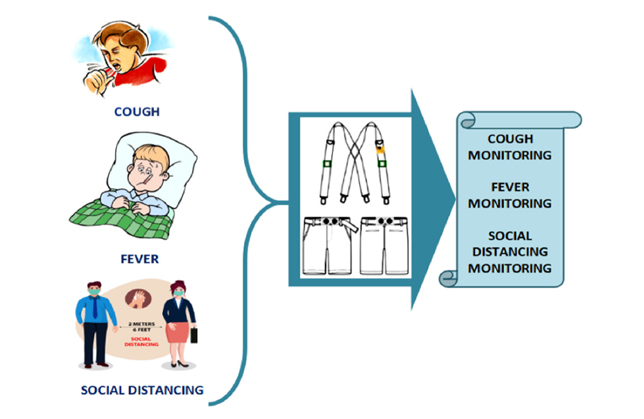 Persistent dry coughing and abnormally high body temperature are identified as more relevant risk factors associated with the COVID-19 crisis. Besides these, maintaining 6 feet social distancing norm was also recognized as a crucial factor. By taking these three features into consideration, the research group consisting of Dr Kshirasagar Sahoo, Assistant Professor, Department of Computer Science and Engineering at SRM University-AP have designed a smart, reliable and efficient COVID-19 tracking device model to monitor suspected infected people in public places. The device named “Smart COVID-Shield” utilising the IoT technology is equipped with a suspender and a belt to be placed over the clothes of the user which constitutes a cough detect unit, temperature detects unit and distance computing unit. Coughing and temperature patterns can be detected through the PIR sensor of the suspender while a belt with an ultrasonic sensor can be used to track people who violate the 6 feet social distancing norms in a real-time environment. A research paper titled “Smart COVID-shield: An IoT Driven Reliable and Automated Prototype for COVID-19 Symptoms Tracking” is published in Computing Journal as a part of the project.
Persistent dry coughing and abnormally high body temperature are identified as more relevant risk factors associated with the COVID-19 crisis. Besides these, maintaining 6 feet social distancing norm was also recognized as a crucial factor. By taking these three features into consideration, the research group consisting of Dr Kshirasagar Sahoo, Assistant Professor, Department of Computer Science and Engineering at SRM University-AP have designed a smart, reliable and efficient COVID-19 tracking device model to monitor suspected infected people in public places. The device named “Smart COVID-Shield” utilising the IoT technology is equipped with a suspender and a belt to be placed over the clothes of the user which constitutes a cough detect unit, temperature detects unit and distance computing unit. Coughing and temperature patterns can be detected through the PIR sensor of the suspender while a belt with an ultrasonic sensor can be used to track people who violate the 6 feet social distancing norms in a real-time environment. A research paper titled “Smart COVID-shield: An IoT Driven Reliable and Automated Prototype for COVID-19 Symptoms Tracking” is published in Computing Journal as a part of the project.Abstract of the paper:
IoT technology is revolutionizing healthcare and is transforming it into more personalized healthcare. In the context of the COVID-19 pandemic, IoT’s intervention can help to detect its spread. This research proposes an effective “Smart COVID-Shield” that is capable of automatically detecting prevalent symptoms like fever and coughing along with ensuring social distancing norms are properly followed. It comprises three modules which include Cough Detect Module (CDM) for dry cough detection, Temperature Detect module (TDM) for high-temperature monitoring, and Distance Compute Module (DCM) to track social distancing norm violator. The device comprises a combination of a lightweight fabric suspender worn around the shoulders and a flexible belt wrapped around the waist. The suspender is equipped with a passive infrared (PIR) sensor and temperature sensor to monitor persistent coughing patterns and high body temperature and the ultra-sonic sensor verify 6 feet distance for tracking an individual’s social distancing norms. The developed model is implemented in an aluminium factory to verify its effectiveness. Results obtained were promising and reliable when compared to conventional manual procedures. The model accurately reported when body temperature rises. It outperformed thermal gun as it accurately recorded a mean of only 4.65 candidates with higher body temperature as compared to 8.59% with the thermal gun. A significant reduction of 3.61% on social distance violators was observed. Besides this, the latency delay of 10.32 s was manageable with a participant count of over 800 which makes it scalable.
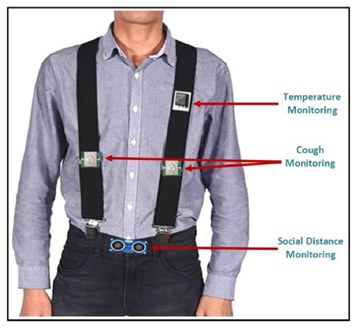
This is a collaborative work of H. K. Tripathy, S. Mishra from School of Computer Engineering, KIIT Deemed to Be University, Bhubaneswar, Odisha, India and A. Nayyar from Graduate School, Faculty of Information Technology, Duy Tan University, Da Nang 550000, Vietnam.
Early detection of the coronavirus symptoms is one feasible means to restrict the spreading of coronavirus. The IoT enabled “Smart COVID-Shield” is developed and implemented in this study to monitor social distancing violators in crowded places. In future, all other COVID symptoms can be incorporated into the model to make it more effective and real-time. An emergency alert module can also be included as part of the model to create awareness among people. An enhanced security mechanism can be further embedded in the working model to prevent any data compromise and dilution in data availability.
Continue reading → - Facebook Metaverse Spark AR Hackathon Winners January 27, 2022
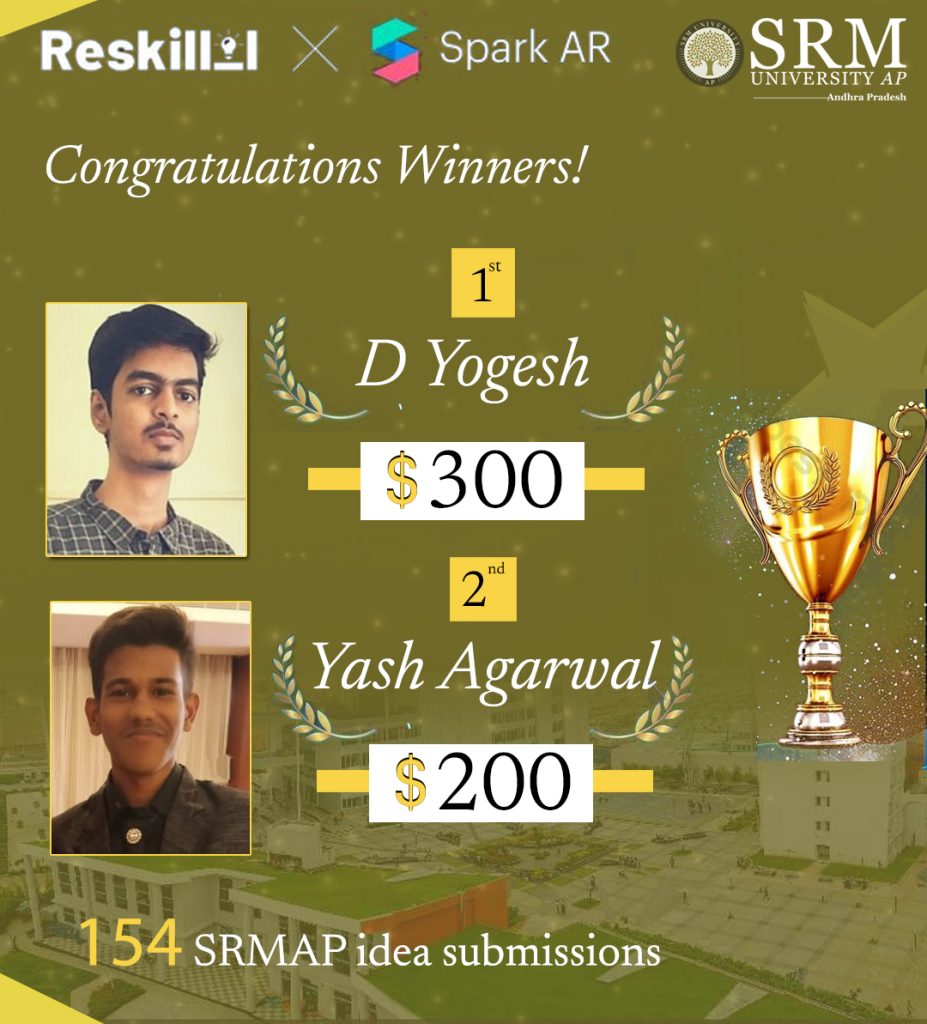 Skilling up is always encouraged at SRM University-AP. With cutting-edge technology and premier instructors provided to support curious, enthusiastic, and innovative minds, skilling up is fun, fantastic, and comes with fabulous prizes too.
Skilling up is always encouraged at SRM University-AP. With cutting-edge technology and premier instructors provided to support curious, enthusiastic, and innovative minds, skilling up is fun, fantastic, and comes with fabulous prizes too.In the Metaverse Spark AR Hackathon conducted by Meta (Facebook), D Yogesh and Yash Agarwal have bagged the winner’s and runner’s up prizes of $300 and $200 respectively. Not just that, 154 of our students would take away from this competition lucrative goodies and participation certificates for their idea submissions.
The CR&CS department organized workshops and trained our students specifically for this event alongside their regular upskilling for placements and other hackathons and contests.
Over a huge number of students who participated in this contest from different corners of the globe, the students of SRMAP walking away with the prizes make a sizable chunk.
We extend our heartfelt wishes to all the participants and hope to see them ace every challenge they face with the knowledge imparted and the skills honed here.
Testimonials
“It was my first hackathon that I participated in and being a part of the SRM AP Hackathon Club has helped and motivated me greatly. Having an interest in AR/VR, this AR hackathon offered me a good opportunity to learn more about the technology. I attended a workshop, conducted by Meta where they introduced us to Augmented Reality. I learned how Instagram filters were made from scratch, and, in addition, I gained technical knowledge about Augmented Reality. I made an Instagram filter that was based on the PUBG Mobile game.
As part of the hackathon, I would like to thank the CR&CS department for the smooth conduction of the hackathon. Also, I would like to thank Priyanka ma’am (link here) and Raghunathan sir (link here) for their time and assistance in the process. I’m very happy that I have acquired a new skill and looking forward to contributing to the Metaverse! Explore the 4.0 technologies”
-Yogesh D
“The hackathon was about creating an AR effect. I made an AR effect on the theme based upon the popularly known web series “SQUID GAMES”.
A special thanks to one of my friends, S. Lokesh who helped me a lot to make me understand how to make an AR effect. I would like to thank Dr T. Raghunathan and Dr Priyanka from the SRM-AP Hackathon club for encouraging and guiding me to participate in this competition.
I am eagerly waiting for many more Hackathons wherein I can participate under the guidance of the SRM-AP hackathon club. Winning doesn’t matter, but participation matters”
-Yash Aggarwal
- 73rd Republic Day Celebrations January 27, 2022
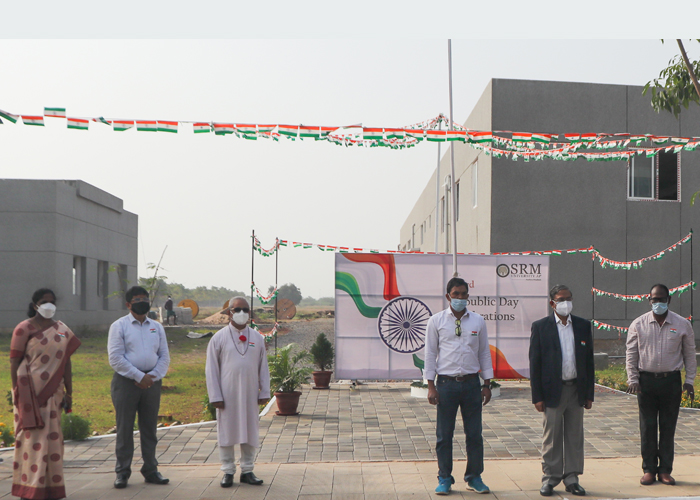 On January 26, 2022 at 9.00 am IST, SRM University-AP celebrated 73rd Republic Day Celebrations with a display of strong unwavering patriotism with all protocols in place. All the staff members and students came together virtually to honour our constitution, our culture, and the celebration of our unity in diversity.
On January 26, 2022 at 9.00 am IST, SRM University-AP celebrated 73rd Republic Day Celebrations with a display of strong unwavering patriotism with all protocols in place. All the staff members and students came together virtually to honour our constitution, our culture, and the celebration of our unity in diversity.The event was an auspiciously planned by the Department of Student Affairs. The flag was unfurled and it was followed by the National Anthem.
- The priority was given towards good health and good physical practices on this Republic Day and a note on the importance and providence of Yoga was provided by Dr Venkat Nori who then guided everyone through the various steps of Surya Namaskar. Dr Nori’s elaborate and passionate detailing of integrating Yoga into our 21st Century Lifestyle with a refreshing take on its growing necessity was a crucial message to not only the students of SRMAP but to the country as a whole.
- The song by Sowmyadeep in his ethreal voice and with the heart pulling lyrics of “Desh Mere” brought a flair of lightness to the occasion.
- In an incredible show of solidarity and togetherness with the whole country and with the SRMAP digital version of the Republic Day parade the students worked hard and prepared informative State Tableaus to represent and celebrate our diversity.
- The dances by Navya and Prasanna transported us out to a world of music and beauty with a show of the creative range that our students have that extends beyond their academics.
- The song by Sruthi was another delicately woven melody that pulled on our heart stings. It was nostalgic and reminded us about what we as a country are striving towards.
- The short movie on Freedom by Movie club was remarkable in executing such brilliance despite the social distancing restrictions in place and is a show of our collective creative strength in face of challenges.
The event came to a close with a mixture of touching and motivating moments. It brought our love for our country and our responsibilities towards it to the forefront of our mind. But most importantly, it gave us the optimism to make our country a better place as we tackle the adversities of today and stay connected.
Continue reading → - Dr Jagadish influenced the young brigade of SRMAP on the making of self-reliant India January 24, 2022
“Using Light to Sense and Interface humans could be the 4th Industrial Revolution,” said Dr Chennupati Jagadish, a distinguished professor in Physics in the Research School of Physics and Engineering at the Australian National University in his talk on “Semiconductor Nanostructures for Optoelectronics Applications” in the fourteenth edition of the University Distinguished Lecture Series conducted by SRM University-AP, Andhra Pradesh on January 22, 2022.
The event was inaugurated by Prof V S Rao, esteemed Vice-Chancellor (SRM University-AP). The revered Pro-Vice-Chancellor (SRM University-AP), Prof D Narayana Rao, powerfully emphasised on event’s motives, vision, and outreach, “Universities are creators of new knowledge, innovative ideas, and providers of talented and skilled manpower to the world.”
Dr Jagadish was honoured as Champion of the Order of Australia for his eminent contributions to Physics and Engineering at the Australia Day Honours 2016. He has acquired the IEEE Pioneer Award in Nanotechnology (2015), the Walter Boas Medal from the Australian Institute of Physics (2013) and the Thomas Ranken Lyle Medal from the Australian Academy of Science (2019).
Dr Jagadish has led the Semiconductor Optoelectronics and Nanotechnology Group as its head since its establishment in 1990 by him. He believes that digital and biological technology will merge in the fourth industrial revolution. As 90% of our information is received by light, the Optical and photo-electronics based trillion-dollar industries will double in their value by 2030. He addressed the growing interest in research and analysis on nanowires in the field of electronics and communications, which could have far-reaching benefits. He noted that the development of nanowires could address a wide range of challenges in science and technology.
The developing research in Augmented Reality, Wearable Optical Sensors, Holographic Displays etc. and the people working on it as the students and staff at SRM University-AP stand to enhance the market and build upon the vision of a self-reliant India, according to Dr Jagadish.
His talk elaborated on the ongoing research, challenges and possibilities of development in this sector, and he concluded on the optimistic note that more and more researchers would come up with new ideas or world-changing solutions.
The event series was attended by over 2300 members from varying walks of the science field from IITs, NITs, IISERs, Universities and Institutions, CSIR, DST, DBT, DRDO, DAE, ISRO, NARL, MoES and several others from different parts of the country.
- Student venture enters global market with $500K investment from Y-Combinator January 23, 2022
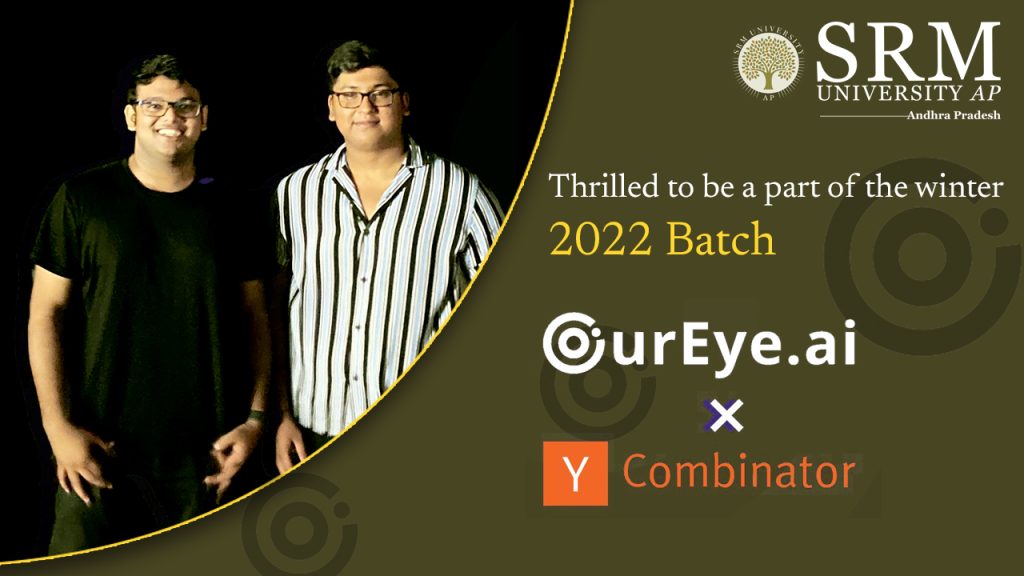 There is nothing more satisfying for a university to see its students achieving their dreams, scaling greater heights. What Sourav Sanyal and Miran Junaidi started as a curious, entrepreneurial adventure during their undergraduate studies has turned out to be a robust business plan attracting investors across the world.
There is nothing more satisfying for a university to see its students achieving their dreams, scaling greater heights. What Sourav Sanyal and Miran Junaidi started as a curious, entrepreneurial adventure during their undergraduate studies has turned out to be a robust business plan attracting investors across the world.OurEye.ai was founded by the duo to provide an automated, end-to-end video intelligence solution for enterprises to monitor surveillance cameras in real-time, leveraging pre-existing CCTV-IP infrastructure. The founders secured an angel investment of $1,20,000 during the initial phase itself from top VC’s and angels in India. On this date, the company has attracted another renowned global accelerator and Investor Y-Combinator with an investment offer of $500K (about INR 3.7 Cr) in OurEye.ai. This remarkable achievement also takes the total amount invested in the company close to $620K (INR 4.7 Cr) in a little more than 12 months since inception. No wonder the duo is celebrating with all their hearts.
Y Combinator (YC) is one of the top American silicon-valley-based startup accelerators that funds the top companies of the world. YC has programmes, resources, and a community that supports founders throughout the company’s life. Airbnb, DoorDash, Stripe, Dropbox, CoinBase, Reddit, Instacart & Ginkgo Bioworks are a few of the prominent unicorns that were part of the past YC collaborations.
“With the beginning of 2022, we embark on a new journey of Bringing Cameras to Life and creating analytics for the offline world with the help of billions of CCTV infrastructure that has existed for over a decade. Now with YC’s support, we wish to do more,” said Miran Junaidi, Co-Founder of the Company.
“It has been the most exciting ride of my life. Starting up with OurEye.ai while in university to graduating a couple of months ago with a major dream come true. We have learnt a lot and learnt it the hard way that ‘Idea isn’t king, execution is’. It has been the best couple of years, and there could not be a better time to start up. After testing and executing the waters on the national market, we are now aiming to expand in the global market and grow at lightspeed.” said Sourav Sanyal, Founder of the Company.
“Y-Combinator picks just about 70 or fewer startups from India over 2 batches every year. This is a major milestone for our students and their startup. Miran and Sourav were extremely passionate about their company from the initial days. That is what motivated the world’s largest startup accelerator to believe in their startup. I am confident that investors and customers around the world will soon reinforce that belief and propel them to unicorn status,” said Dr Sathyanarayanan, President of the University.
“We take immense pride and happiness in our student’s achievements, and this is still just the beginning. I am certain that this milestone will continue to inspire not only our current students but also all the students out there with entrepreneurial ambitions. Here, at SRMAP, our primary focus is to bring out the best among our students, be it research, entrepreneurship or higher studies,” said Prof V S Rao, Vice-chancellor, SRM University-AP.
Continue reading → - Students distribute winter clothing among slum dwellers January 22, 2022
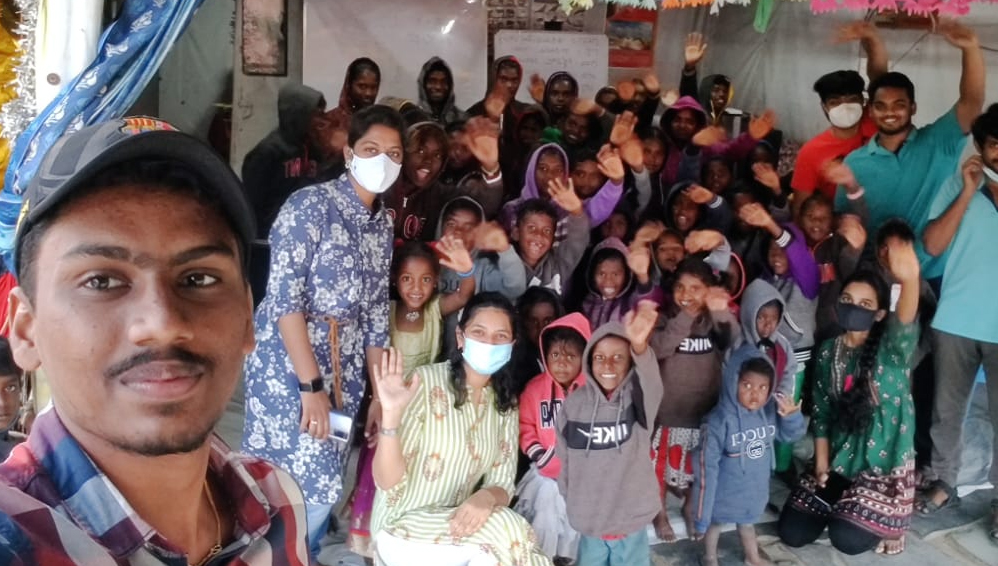 In a major initiative by the students of SRM University-AP, sweaters were distributed among the poor kids living on the streets of Guntur. Under the initiative, students from the 2018 batch of Computer Science Engineering, Civil Engineering, Mechanical Engineering, Electronics and Communication Engineering, and Management Studies visited slum areas on the roadside near Shri Hospital, Guntur and distributed clothing among 44 kids ranging from 3 to 16 years old.
In a major initiative by the students of SRM University-AP, sweaters were distributed among the poor kids living on the streets of Guntur. Under the initiative, students from the 2018 batch of Computer Science Engineering, Civil Engineering, Mechanical Engineering, Electronics and Communication Engineering, and Management Studies visited slum areas on the roadside near Shri Hospital, Guntur and distributed clothing among 44 kids ranging from 3 to 16 years old.“We know how the families whose sustenance depends on the street have suffered during the pandemic. I am sure these small acts will bring cheers to these families,” said Prof V S Rao– Vice-Chancellor of the university. Prof B V Babu– Dean, School of Engineering and Sciences- highlighted the wonderful gesture saying “I am really glad to see the sensitivities and sensibilities our students have in sharing and giving”. Ms Revathi Balakrishnan– Assistant Director, Student Affairs appreciated the efforts, selfless service and compassion of SRM AP students to the lesser privileged.
Continue reading →


